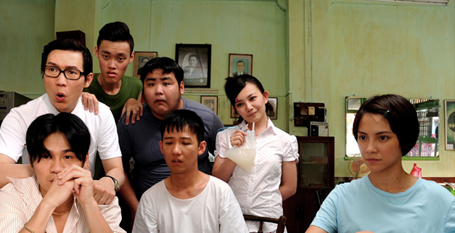
First a little history about the music scene in Singapore and Malaysia would be useful in understanding this film. In the mid-90s "Xinyao" reached its apex of achievement not in the hands of its creator Liang Wern Fook, but in the Malaysian singer/songwriter Tan Kheng Seong, otherwise known as Ah Niu. A film graduate of INTI College KL, the Province Wellesley native scored a hit with his ditty “对面的女孩看过来”. Ah Niu's most well-remembered songs continued the trademarks set down by Liang Wern Fook and expanded their scope. Themes as nostalgic remembrance of days past were a given, as well as evoking the simple pleasures of daily life and a certain cultural pride in the use of Manglish/Singlish/dialect slang turned up on a regular basis.
Come the oughts and Ice Kacang Puppy Love. The pop cultural scene in the region is drastically changed. Many of Malaysia's top young Chinese entertainers have made a name for themselves in the region. The names that populate the cast, like Angelica Lee, Fish Leong, Penny Dai, Guang Liang and Eric Moo, are a list of such successes. (The only name missing from the cast seems to be that of Datuk Michelle Yeoh.) And Ah Niu, once their bard, reinvents himself as their director, telling their story.
It is no surprise, that the theme of leaving and nostalgia seems to be such a common narrative in Malaysian Chinese folk-pop, as it is for this film as well. Much of the film is set in Malaysia's chronically underdeveloped, mostly intact but falling apart colonial small towns, the odd sense of nostalgia stems from a sense of community that in retrospect seems close-knit and neighbourly, but in reality was probably more like a minuscule police state: a parochial, gossipy and prejudiced environment with everyone knowing everyone else and not many visibly employed.
Fighting Fish (Angelica Lee) and her mother moved to a small town in Ipoh to escape her coarse, abusive father (a nearly unrecognisable and very pudgy Eric Moo), and her mother starts to work in a coffee shop to support them both. During which the socially awkward but artistically gifted kopi kia Botak, played by Ah Niu himself, falls for Fighting Fish. But Botak is also watched upon by another girl played by Fish Leong. Meanwhile, the story unfolds in lazy, vignette-like fashion over the denizens of the small Ipoh town, as they fall in love, leave and linger, and eventually, go their separate ways.
This was a pet project for Ah Niu, and word is that he was at one point financially busted while producing this story of the pangs of first love. The result is forgettable but does not disappoint while it lasts. Unlike a certain filmmaker from a neighbouring country south of the peninsula, Ah Niu does not force-feed big messages about filial piety, family values or a meritocratic society into his story, and lets it unfold with a lyrical, controlled rhythm. While his editing and transitions show promise, his framing and composition still feel unnatural and overtly artificial, hence undercutting the overall attempt at giving the story a natural, lifelike feel. His story unfolds almost in the fashion of one of his songs on the soundtrack performed by himself and like the titular ice kacang: corny, sweet, a little mushy. Ah Niu's awkwardness in his acting debut almost translates into a natural dimension of the character of Botak, and he delivers a performance that is a hit and miss affair; good casting but inexperienced acting. The rest of the cast deliver natural performances, and the script eschews the clumsy social commentaries, lame puns and the tangents of five-minute mini-sketches that plague the work of a certain filmmaker from a neighbouring country on the peninsula. With this movie, one looks forward to what Ah Niu can make in future and hope he improves and refines himself as a filmmaker.












 Printable Version
Printable Version










Reader's Comments
Be the first to leave a comment on this page!
Please log in to use this feature.